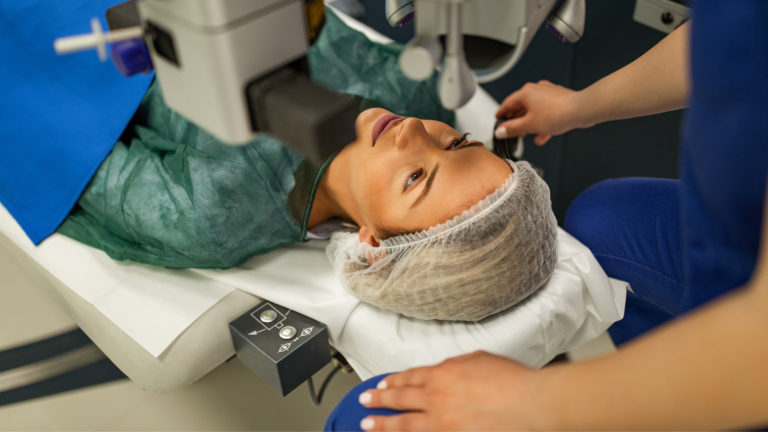
Your cornea is the clear and transparent tissue on the top layer of your eye. It is made up of several layers: the epithelium, Bowman’s layer, the stroma, Descemet’s membrane and the endothelium. Your cornea is responsible for refracting or bending light that enters the eye. It acts as your eye’s outermost lens, providing about 75% of your eye’s focusing power.
LASIK, or laser in-situ assisted keratomileusis, is a refractive surgery procedure that uses a laser to remove corneal tissue and change the curvature of the cornea. Reshaping the cornea corrects common vision errors including nearsightedness (myopia), farsightedness (hyperopia), and astigmatism. Because the LASIK procedure requires corneal tissue to be removed, corneal thickness plays an important role in the structural integrity of a patient’s cornea. At Coastal Vision, our approach in assessing patients’ corneal thickness to determine candidacy for LASIK focuses on the long-term health, safety, and stability of the cornea.
How LASIK Surgery is Performed
During femtosecond laser-assisted LASIK surgery, a flap of 100-120 microns (μm) in thickness is created, which cuts through the epithelium, Bowman’s layer, and a thin section of the stroma. This flap is then lifted by a different laser, called an excimer laser, which is used to reshape the cornea. The excimer laser works by removing or ablating microscopic amounts of corneal tissue until the desired shape is reached to correct vision. The higher the correction, the more corneal tissue removal is needed.
The excimer laser is capable of ablating corneal tissue to a high degree of accuracy without damaging the surrounding tissue. Technological advances in excimer lasers have allowed corneal refractive surgery to become more predictable over time, with safer and more effective results in improving visual acuity. When laser contouring is complete, the flap is replaced and begins to heal immediately without the need for stitches.
At Coastal Vision, we pride ourselves in providing the best medical and surgical ophthalmologic care for our patients using the latest and safest technology available. Our lasers are state of the art and provide excellent precision with great outcomes. Our ophthalmologists are also trained in the latest surgical techniques such as the beveled flap cut to provide optimal results in stronger flap healing.
Why Corneal Thickness is Important
Because corneal tissue is ablated during LASIK surgery, there is a minimum threshold of corneal thickness needed to remain after LASIK to ensure safety and stability of a patient’s cornea over time. There must also be enough corneal tissue in place to be reshaped. At Coastal Vision, we follow the recommendations from the American Academy of Ophthalmology. In a recent publication by Buckner, MD et. al (May 2020), a corneal thickness of about 300 μm was recommended to remain after ablating and before the flap is repositioned. Our excimer laser has an active real-time pachymeter that can assess the residual corneal bed thickness before and after excimer laser ablation.
Thin corneas can make LASIK surgery riskier, potentially leading to serious complications over time. The cornea may not be able to maintain its shape and curvature resulting in a rare complication called corneal ectasia. For patients with a higher preoperative prescription, corneal thickness plays a larger role since more tissue must be ablated to achieve vision correction.
Post-LASIK corneal ectasia resembles keratoconus where the cornea bulges outward into a cone shape. It is therefore important to address corneal thickness before LASIK surgery to identify if a patient is a good candidate for LASIK. Otherwise, corneal thinning combined with internal eye pressure can lead to distorted vision. Surgeons can also determine the trade off in the amount of corneal tissue removed with potential night vision quality to maintain long-term, adequate corneal structural integrity, depending on the patient’s age and eye conditions. It is important for patients to discuss the risks and benefits of LASIK with their surgeons.
Corneal Care at Coastal Vision
At Coastal Vision, we provide comprehensive corneal imaging to determine if a patient is a good candidate for LASIK. Our ophthalmologists use advanced imaging technology to assess a patient’s corneal topography, and preoperative corneal thickness is weighed with other factors including the patient’s age, medical history, and prescription strength. Oftentimes, multiple machines are used to assess different aspects of the corneal thickness, shapes, asymmetry and tear film quality.
LASIK Alternatives
If you are not a good candidate for LASIK, there are other options available. PRK, or photorefractive keratectomy is a type of refractive surgery that uses a laser to change the shape of the cornea without creating a flap. It is a great alternative for patients with thin corneas and low correctional value.
Another alternative is implantable collamer lenses (ICL). ICL act similarly to contact lenses, except instead of placing them on top of the eye, ICL are surgically positioned inside the eye between the iris and natural lens of the eye. Collamer lenses are highly biocompatible with the eye and have been used successfully inside the eyes for a few decades. ICL remain in the eye permanently, providing exceptional quality of vision. Collamer lenses are a great alternative for myopic patients with thin corneas and/or high degree of myopia with or without astigmatism.
Ready to Start Your Journey to LASIK?
Our Coastal Vision LASIK consultants are available to help you determine your LASIK options. Visit our LASIK page for more information. When you’re ready, call (888) 501- 4496 to schedule a free consultation. The Coastal Vision Medical Group proudly serves the Orange, Irvine, Long Beach, Norco CA areas with LASIK and other refractive surgery services.







